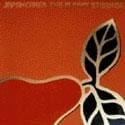
I’ll be the first to admit that I’m skeptical of any band that doesn’t practice and that plays a D-chord for 45 minutes in a live performance. But, Japancakes can pull it off. On their third release, The Sleepy Strange, Japancakes offers an eclectic sound tinged with hypnotic country and moody cello. Keyboards, guitar, drums, and pedal steel are added, to create an atmospheric symphony somewhat, but not completely, comparable to the likes of Shudder to Think, Air, and Philip Glass.
Japancakes formed in 1997 in Athens, Georgia, under the direction of Eric Berg. Athens, being the birthplace of notables such as R.E.M. and most recently the Elephant 6 collective bands, is a musical hotbed. The current Japancakes lineup includes Heather McIntosh, a cellist who has played with many of the Elephant 6 collective bands including Elf Power and Of Montreal. Also in the lineup are Nick Bielli of Hayride and pedal steel player John Neff of the Star Room Boys.
Berg claims that a big influence on the band is Ravi Shankar. “I fell in love with the sitar a few years ago”, he said in the CMJ New Music Report (13 December 1999), “and was blown away by Ravi Shankar and his use of improvisation”. He said he also loved arrangements by Abba and the Carpenters. And his idea of using pedal steel came from his brother, who turned him on to Speedy West, a pedal steel guitarist in the 1950s and 1960s.
The music is entirely instrumental. What makes this music so amazing is that it doesn’t need vocals to keep listeners interested. Perhaps it’s so interesting because the order to the songs come from seeming chaos. The band decides on basic melodies, but doesn’t rehearse together. Each musician goes into the studio individually and plays a repetition of a phrase over and over for hours. With the guidance of Berg along with producer Andy Baker, who has produced for Macha, the Mendoza Line and Glands, the music is combined to create the slick sounds that Japancakes has been noted for.
The sounds on Sleepy Strange will calm the chaotic mind and soothe listeners into a restful state. The songs will not, however, put anyone to sleep. There are too many interesting nuances, too many different genres combined, to make this music bland. Depending on whom you ask, experimental, can be an adjective that can either disgust or arouse. But, calling Japancakes experimental is definitely a compliment. Through a seemingly random way of piecing together the instrumentation, Japancakes produces layered music that is tight and intricate. It’s like the complexity that comes with simplicity. Japancakes is adopting the tradition of Bach, who used a few notes to create intricate fugues. Not that Bach and Japancakes really are comparable. The point is that it doesn’t take many notes to make a fascinating piece of music. What makes music so intriguing is the combination of instruments and the observance of tiny patterns that emerge from the work as a whole.
